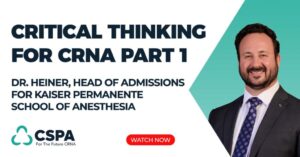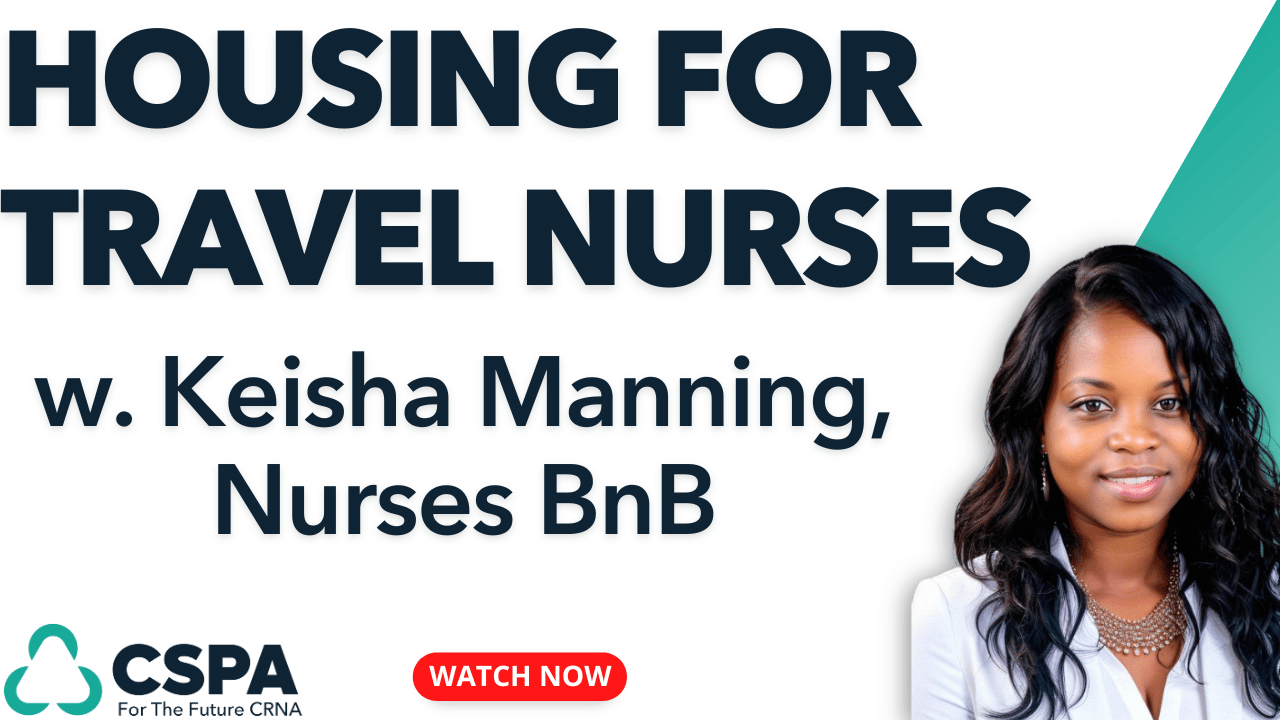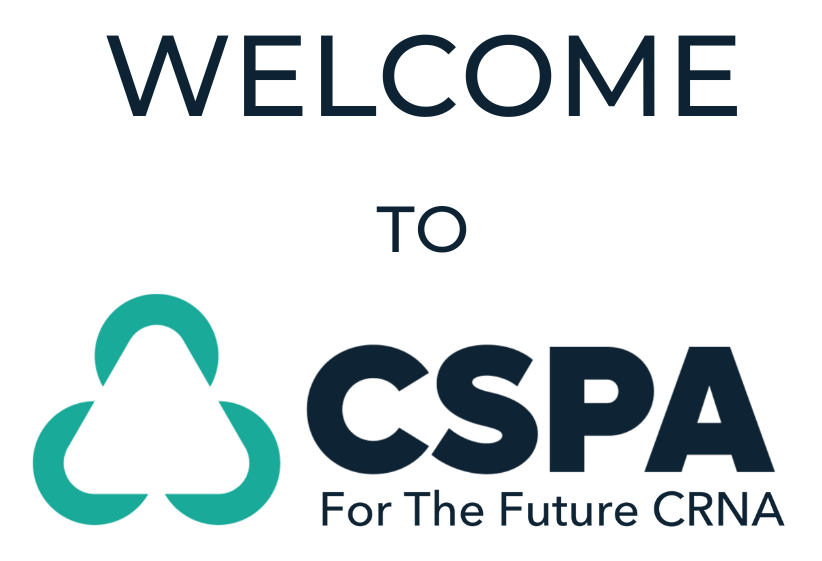
Get Your Free CRNA School Interview Prep Guide
Free CRNA School Interview Prep Guide Click Here
Dr. Jeremy Heiner, EdD, CRNA Head Of Admissions and Program Faculty at Kaiser Permanente School of Anesthesia joins Dr. Richard Wilson for Episode 5 of the Nurse Anesthesia Educators Unplugged Podcast, a podcast exclusively for CRNA School Prep Academy students.
Here’s a sneak peek of their discussion as they tackle the topic of Critical Thinking, including understanding exactly what Critical Thinking is and how it relates to Nurse Anesthesia. They also discuss how Critical Thinking is developed in the ICU and why it’s an important concept for CRNA school applicants.
Listen to the full episode inside CRNA School Prep Academy today!
Join CRNA School Prep Academy for Complete Access to This Episode and the Entire Nurse Anesthesia Educators: Unplugged Library PLUS ALL of the Planning & Application Tools, Interview Prep Tools and More That Have Helped Thousands Of Nurses Gain Acceptance Into CRNA School: https://www.crnaschoolprepacademy.com/join
Book a mock interview, personal statement critique, resume review and more at https://www.TeachRN.com
Join the CSPA email list here! https://www.cspaedu.com/podcast-email
Send Jenny an email or make a podcast request!
Hello@CRNASchoolPrepAcademy.com
—
Watch the episode here
Listen to the podcast here
Critical Thinking For CRNA Part 1 With Dr. Heiner, Head Of Admissions For Kaiser Permanente School Of Anesthesia
I have some exciting news to share with you. We have released the Nurse Anesthesia Educators Unplugged, which is going to be your gateway to success. I want you to discover the inside scoop. I want you to be able to navigate the complexities of CRNA admissions and thrive as a candidate and a nurse anesthesia resident, which can seem like a daunting task, but what if you had a trusted guide at your fingertips? This is why we’re excited to introduce the Nurse Anesthesia Educators Unplugged, which is CSPA’s private podcast, your one-stop auditory guide to achieving your CRNA dreams.
Here are the key benefits and features of this private podcast. We will hear directly from the experts, listen to seasoned CRNA faculty members who know the admissions process inside and out, and get invaluable insights, not from the brochures or websites. You’re going to hear from behind the scenes and discover the lesser-known details of the selection process, the traits that faculty look for in candidates, and the hidden pitfalls to avoid.
Knowing that all schools are a little unique, this is going to give you that invaluable insight that’s going to allow you to see the differences between different CRNA programs and the faculty that run these programs. You’re going to hear real stories, hear from successful students who have been in your shoes, and learn about their challenges, strategies, and what made them stand out. You’re going to get strategic advice. Beyond grades, how can you learn to craft a compelling application such as for your essay or your interview responses that will resonate with the admissions teams?
You’re also going to get flexible learning. You can listen to this podcast on your commute, during your workouts, or even while cooking. We want this learning to fit your schedule. You’re going to hear a lot of Q&As on these podcasts. These questions and answers are found in our private CSPA community. We pick questions that are commonly asked by CSPA students and bring them to the table during this faculty podcast. It’s a great way to hear commonly asked questions from a variety of faculty and different insights on that.
We also want you to stay up-to-date. The admissions landscape is always changing. We want to make sure that you’re updated on the latest trends, requirements, and strategies for success. Last but not least, we want to help you build confidence. Knowing what to expect and how to prepare can dramatically increase your confidence, giving you the edge during the application interview process.
I hope this sounds exciting to you. I hope you’re as pumped as I am to tune into these shows. Remember, if you’re a CSPA student, you’re going to have access to this private podcast, but don’t worry. We want to make sure we’re not excluding anyone from this podcast. On occasion, we are going to share sneak peeks with our regular CSPA audiences because I want everyone to succeed.
Whether you’re a CSPA member for twelve months or a short period, you’re going to have access to the entire library of private CSPA faculty podcasts. This is a valuable resource that we are excited to bring to you. I want to lead you to the conclusion that whether or not you’re contemplating a CRNA career or you’re already deep in the application process, the Nurse Anesthesia Educators Unplugged is your secret weapon to equip yourself with the knowledge, strategies, and confidence to stand out. I hope you enjoy the sneak peek. Let’s go ahead and get into the episode.
—
What is Critical Thinking?
In this episode, I am excited about our guest. We’ve got Dr. Jeremy Heiner with us. Jeremy is with the Kaiser Permanente School of Anesthesia. He graduated there in 2004. He’s been practicing as a CRNA since. He’s been in academics since 2008. He holds an official position within the program as an academic and clinical faculty member and the Director of Admissions, which works out well for this show. We’re excited to have him. Jeremy, it’s good talking to you. Welcome to our show.
Thank you, Dr. Wilson, for hosting me. We’ve been trying to get together for several weeks. I’m glad we finally nailed down a date. I’m excited to be here and talk about anesthesia school, critical thinking, and all the things.
One thing that we’ve seen and been talking offline a little bit, you and me, is how we are seeing the nurse and the nurse anesthetist from years ago transition into what they are now. That means that this is a change. The practice models, education, and expectations have changed. In your mind, what is critical thinking all about?
It’s a big topic. I like how you use the word expectation because in our profession, nurse anesthesiology and nurse anesthesia, we’re expected to do a lot. Looking back at COVID and all the CRNAs throughout the nation, they were asked to go into areas where they traditionally didn’t work. They were plug-and-play. We were the MacGyvers of the hospital. We could be put in any scenario and situation and manage it. The expectation for us to be able to fill a role is high, certainly in anesthesia but also in other areas of the hospital.
What would you say is your definition of critical thinking? That’s what a lot of these individuals want to know. It varies from institution, which is unfortunate. As an educator, admissions counselor, or admissions leader, what are you looking at when you talk about critical thinking in the definition of it?
If you’re looking at it from an academic perspective, you could say something like, “It’s the art of analyzing and evaluating information so that you can make a judgment and decision.” The whole process of doing that, analyzing and evaluating it, requires experience and knowledge, experience, and you sometimes screw up and get better. It’s a constant process. I use the word art because that is something that you continually have to practice, do, and gain experience in.
Critical thinking is thinking about thinking. It’s getting into how I make a decision. How do I apply the knowledge that I’ve gained to make a decision? When we’re looking in the clinical area and if you’re an ICU nurse, how do you take that knowledge that you gained in nursing school when you were studying for the CCRN, the times that you’ve been in the ICU, and the patients that you’ve taken care of? How do you take all of that? When there’s a problem in the patient that you’re admitting, maybe they’re hypotensive, how do you take all that information that you’ve learned and make a decision that will benefit the patient?
There are two phrases that you mentioned there, which I’m going to go ahead and forewarn you about- I’m stealing one of them to use, which is “thinking about thinking”. It is a big key when we look at critical thinking because we do see and notice that there has been a trend in healthcare, for better or for worse, moving more towards protocols for “patient safety” versus thinking processes.
This frustrates a lot of people but we have to think about what we’re thinking about and be able to analyze it, which is the second phrase I love that you talked about. It’s not just necessarily being able to say, “I’ve seen this issue arise. I’m seeing this trend. I’m seeing something occur.” When you talk about critical thinking, it’s analyzing what you see and hear.
You mentioned protocols and checklists. I’m a big proponent of crisis checklists. They’re very helpful because we’re all human. We can’t retain it. It’s in there somewhere but we can’t automatically bring it up all the time. There are a lot of other factors that come into play, especially in a crisis. They’re going to impair your thinking to some degree. That’s where these crisis checklists are valuable.

Critical Thinking: Crisis checklists are very helpful because we’re all human and we can’t retain all the information.
The key to crisis checklists is how to use them and when to use them. You can’t use a malignant hyperthermia checklist if the patient doesn’t have malignant hyperthermia. They may have a fever or elevated tidal CO2 but that isn’t necessarily malignant hyperthermia. You have to get to the diagnosis first. You have to have that critical thought process to get there before you can effectively use these cognitive aids.
CRNA School Waitlist
I can remember my first interview in anesthesia school. I was waitlisted after my first year. I came back with more knowledge in the second year because my director at the time told me to get more knowledge in what I was doing. I would fight for patients to get that practice because I knew that’s what I needed. Without that repetition of that practice and an intentional focus on it, I wasn’t going to get better at it.
There it is right there. One, you listened. Somebody told you what to do, you listened, and you put yourself out there. You got the experience. You looked for those difficult patients. You sought out those challenging cases. One other major key here is to always be curious. Always look to see what you can do better. Never be satisfied. You are looking for those difficult patients, taking care of them, seeing what you can do better.
After the shift, you’re driving home thinking, “I had this patient. They have these medications going. How could I have improved the hypotension that was occurring? Was there something that I could have communicated better, a drip that I could have managed better, or a medication that I could have suggested to the ICU attending that would’ve been a better option because I looked in and researched? Levophed is better than dopamine in certain circumstances.”
I talked a little bit about practicing deliberately. There’s a concept called deliberate practice. I know you’ve heard of this concept before and some of your readers have heard of it. To break it down, if we’re talking about deliberate practice, it has four components. You have to be motivated to do something. You have to have a goal and be focused on doing it. You need feedback and repetition.
The motivation is you have to have a goal in mind. It’s something you want to do and improve. It’s something that brings you out of your comfort zone because that’s where the learning occurs, when you’re not comfortable. The focus is breaking that down into small, manageable tasks. Some people will call these micro-skills. If you’re focusing on improving a procedure, we can break that down into micro-skills.
Critical thinking is thinking about thinking. How do I apply the knowledge that I've gained to make a decision? Share on XOnce you are performing these skills and breaking them down, you need somebody to give you feedback, somebody who is an expert, a mentor, a coach, or somebody who’s experienced. The thing that puts it all together is you constantly repeat it. That’s how you deliberate practice, repetition, constantly doing it over and over and trying to improve.
Let me give you an example. This could be pertinent to some of your readers in the ICU. Over the last decade or so, ultrasound has made an appearance in all clinical settings, which is a good thing. We use it a lot in anesthesia practice. One area that ICU nurses may be able to use is when they’re placing IVs or intravenous lines. They use it a lot in the ERs and ICUs. We use it in anesthesia. We get difficult sticks all the time.
This is a skill that will benefit you as an anesthesia provider if you can put in an IV using an ultrasound. If we’re going to use deliberate practice with an ultrasound, you should be breaking it out in almost every IV you do. Use it on the easy IVs and get out of your comfort zone. Break the skill down into micro steps. How do you hold the needle and the probe? What is the distance between the needle and the probe? What exactly are you looking for, that little star, the needle, as you’re advancing it?
What are you looking for in terms of the anatomy and when you’re next to the vein? What things do you want to do to make sure you’re midline and see where you’re at? What’s the feeling? What’s the length? I would even practice on veins that you can see right on the skin. That will help you dial in those skills. Have somebody good at that watch you do it and give you feedback. Repeat the process.
—
That sums up the show. Thank you so much for reading. I hope you found that so valuable. I look forward to sharing some more golden nuggets with you in the future. If you’re a CSPA member, there will be an entire section inside the academy that’s labeled Nurse Anesthesia Educators Unplugged Podcast. It will be inside the membership. You log into your membership to have access to this. You can play this on audio whenever you are driving, cooking, folding laundry, or whatever fits your learning style.
We hope you find a lot of value in these episodes, and we’re excited for future episodes to share with you. Until next time, thank you so much for reading. I appreciate you. If the show has been helpful for you and your CRNA journey, I would so very much appreciate it if you were able to share this valuable show with others that you know who are embarking on their CRNA journey. I call it paying it forward.
If this has been a valuable resource for you or a valuable tool on your CRNA journey, I would greatly appreciate it if you were able to share it with someone else down the road. Even if you don’t know anyone, keep us in mind to make sure you send people our way because we want to help you and your peers find success. Cheers to your future. Thank you so much. Until next time, take care.
Important Links
FREE! CRNA School Interview Prep Guide: https://www.cspaedu.com/irptwqbx
Join CRNA School Prep Academy for Complete Access to This Episode and the Entire Nurse Anesthesia Educators: Unplugged Library PLUS ALL of the Planning & Application Tools, Interview Prep Tools and More That Have Helped Thousands Of Nurses Gain Acceptance Into CRNA School: https://www.crnaschoolprepacademy.com/join
Book a mock interview, personal statement critique, resume review and more at https://www.TeachRN.com
Join the CSPA email list: https://www.cspaedu.com/podcast-email
Send Jenny an email or make a podcast request!









